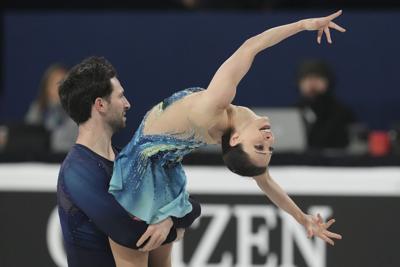Deanna Stellato-Dudek has been feeling on top of the world since she obtained Canadian citizenship three months ago. That means the Chicago-born pairs skater can fly the Maple Leaf at the Milan-Cortina Olympics next year.
The question remains whether she can finish on top of the worlds in Boston this week.
Stellato-Dudek and partner Maxime Deschamps certainly have the strut advantage of coming into the 2025 world figure skating championships as the defending gold medallists. But it has not been an even keel season for the couple, contending with injuries and illness. Even their finest performance — a season’s-best free dance at the Four Continents last month — garnered silver behind 2023 world champions Riku Miura and Ryuichi Kihara of Japan.
After retiring at 17,  she didn’t lace up her skates in 16 years. She’s back and competing against teens, and says age has its advantages.Â
After retiring at 17,  she didn’t lace up her skates in 16 years. She’s back and competing against teens, and says age has its advantages.Â
“Every year is like climbing a different mountain,’’ says Stellato-Dudek who, at 41, is the oldest woman to win a world title in any discipline. “This year has had a lot of treacherous obstacles in our way that we were not expecting.’’
That goes a considerable way toward explaining a fourth-place result in the short program at the Four Continents before surging to the medals. “The short program was very, very messy,’’ Stellato-Dudek admits. “So, for us, it was like a worst-case scenario. It was almost like, well, we’re free to just do however we’re going to do in the long program and have a little more of a relaxed mind frame because something bad had already occurred in the short.’’
This year has been, as Stellato-Dudek puts it, “sickness after injury after sickness after injury.’’ Severe illness and raging fever knocked the stuffing out of Deschamps and knocked the pair out of the prestigious Grand Prix Final in December. Stellato-Dudek, after earlier hurting her wrist and ankle, had a fall — “straight on my glutes’’ — just before the Four Continents in South Korea, causing a gigantic hematoma and bone bruise.
“I couldn’t do landings on the throws, and the takeoff on the toe really hurt. I hadn’t done jumps and throws in a week when I got to my first official practice. The first triple toe — I’ve done so many triple toes in my life so this might sound ridiculous — but I was terrified because I knew it was going to hurt. It was just what degree could I take the pain?’’
Skating with ease and freedom is integral to the pair’s mojo. “Just let it go, just let the skating happen,’’ Deschamps says. “And not try to do everything too good.’’
It was the free skate that plagued the duo through the competitive season. Thus the Four Continents acquittal — on the heels of their third consecutive Canadian title, where Stellato-Dudek fell on a throw triple loop and both made several technical mistakes errors — provided a confidence boost.
“For sure that program really helped us because the whole season we had a little bit of an issue, every time,’’ says Stellato-Dudek. “We have been able to translate what we were doing in practice into competition. And (we know) that we’re capable of doing it now.’’
Deschamps: “We have the experience, the feeling of winning already.’’
Stellato-Dudek, a former singles skater for the U.S. in a career short-circuited by multiple injuries — bone fractures, torn ligaments, hip flexor — was retired for 16 years and working as an esthetician before re-emerging as a pairs skater, then yoked with Deschamps in 2019. Their quick rise as a team was unprecedented, though they were unable to compete at the Beijing Games because she was not yet a Canadian citizen. But it wasn’t an impediment for the worlds, and the pair climbed the rankings.
A year ago, in Montreal, they hit the pinnacle. It’s the sweet spot they’re hoping to duplicate when the worlds get underway Wednesday.
“I felt so much pressure last year at worlds,’’ says Stellato-Dudek. “This year it’s not going to be that much different.’’
Except they’re wiser and more wizened, understand better how to prepare for maximum efficiency at the optimum moment.
“When we placed high, that’s when we really learned to know each other and how to go through hurdles,’’ says Deschamps. “Those circumstances brought us together, found solutions together, analyzed things and see where we can go. Because we are perfectionists, both of us. But that can also work against us sometimes.’’
There’s further pressure because these worlds will determine how many pairs teams Canada can send to the Olympics. Three teams are in Boston and everyone expects three teams will get to Milan: Stellato-Dudek and Deschamps joined by Lia Pereira and Trennt Michaud, bronze medallists at the Four Continents, and Kelly Ann Laurin and Loucas Éthier, bronze medallists at the Canadian championships.
“It’ll be all hands on deck,’’ says Stellato-Dudek. “But we’re a pretty strong unit of six, all three pairs. We all want to have those three spots so we can experience everyone as an Olympic teammate next year.’’



























To join the conversation set a first and last name in your user profile.
Sign in or register for free to join the Conversation